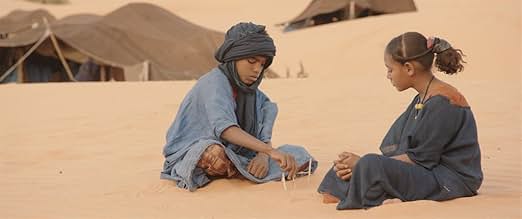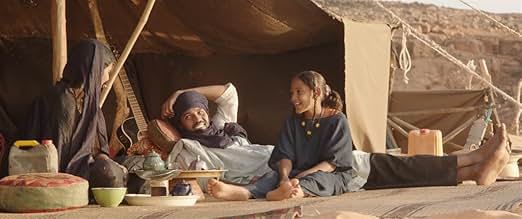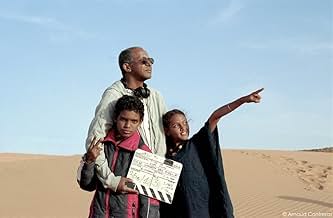A cattle herder and his family who reside in the dunes of Timbuktu find their quiet lives -- which are typically free of the Jihadists determined to control their faith -- abruptly disturbed... Read allA cattle herder and his family who reside in the dunes of Timbuktu find their quiet lives -- which are typically free of the Jihadists determined to control their faith -- abruptly disturbed.A cattle herder and his family who reside in the dunes of Timbuktu find their quiet lives -- which are typically free of the Jihadists determined to control their faith -- abruptly disturbed.
- Nominated for 1 Oscar
- 33 wins & 28 nominations total
Ibrahim Ahmed
- Kidane
- (as Ibrahim Ahmed dit Pino)
Weli Kleïb
- Juge
- (as Weli Cleib)
- Director
- Writers
- All cast & crew
- Production, box office & more at IMDbPro
Storyline
Did you know
- TriviaThe scene in which the cow was killed with a spear was done by sedating the cow under the supervision of a veterinarian and adding the spear digitally in post production - the animal was not harmed.
- GoofsIn the stoning scene, both man and woman are buried up to their necks. In a proper Islamic stoning (rajm), the woman should only be buried up to her waist.
- ConnectionsFeatured in The Oscars (2015)
- SoundtracksShooting The Statues
Composed, Arranged and Orchestrated By Amin Bouhafa
with The City of Prague Philharmonic Orchestra
© 2014 Universal Music France
Featured review
"Let me say this loud and clear. There is a world of difference between terrorist acts and the Islamic Shari'a. Islam is not only a religion, but a way of life. And at its heart lie the sacred principles of tolerance and dialogue." King Hussein I
A popular cliché is to refer to "Timbuktu" as the farthest, out-of-it-all place on earth, like "You can go to Timbuktu for all I care." However, in writer/ director Abderrahmane Sissako's remarkable film, Timbuktu, the world rests in miniature in the sand dunes of gorgeous Mali, where a Bedouin family can languish in the shade of their tent while a small boy herds their cattle and nearby fishmongers ply their trade by a welcoming pond. It is a world seemingly removed from stress, a paradise.
In the cell-phone age, no one is too far away and paradise easily shattered, as the natives use their phones to coordinate their herds and their lives. So do the Muslim jihadists, who use their phones to control the natives, bending them to their will on such mundane matters as wearing gloves and playing music. In a way, the low-key policing by the jihadists employing Shari'a seems to contrast with the notorious ISIS, whose control extends to burning and beheading.
All is relatively tame until one Bedouin's pregnant cow is killed by a fishmonger, and the herder murders in revenge. The Long-distance wide-angle shot of the two men in a death struggle is remarkably beautiful and ominous, like David Lean's memorable Lawrence of Arabia scenes.
The local jihadist authority follows God's law in this case while it takes a woman into custody for not wearing gloves and carries out murderous punishment on musicians. This tranquil paradise slowly becomes a hotbed of repression while the director still shoots lovely scenes that belie the suppression already reaching into the lives that seemed so far removed.
Underneath the obvious meting out of "justice" is the subjugation of women, almost as if radical Muslim orthodoxy had this prejudice as its cornerstone. This film drives that oppression home as few others have done because it makes it a quiet but persistent issue in daily activity. The very peacefulness of the living in Mali and the sweet sparseness of the mise en scene could almost make us think the radicalism is acceptable. But when you see men buried in sand and rocks thrown at their heads, you know life in the sand in not romantic.
Timbuktu is rated PG-13, a triumph in good taste as murder and subjugation are the dominant activities. A film that allows young persons to see the world's injustices through a beautiful lens is a film worth sharing in the hope of removing radical Islamists from paradise. Let them have their virgins and soon.
A popular cliché is to refer to "Timbuktu" as the farthest, out-of-it-all place on earth, like "You can go to Timbuktu for all I care." However, in writer/ director Abderrahmane Sissako's remarkable film, Timbuktu, the world rests in miniature in the sand dunes of gorgeous Mali, where a Bedouin family can languish in the shade of their tent while a small boy herds their cattle and nearby fishmongers ply their trade by a welcoming pond. It is a world seemingly removed from stress, a paradise.
In the cell-phone age, no one is too far away and paradise easily shattered, as the natives use their phones to coordinate their herds and their lives. So do the Muslim jihadists, who use their phones to control the natives, bending them to their will on such mundane matters as wearing gloves and playing music. In a way, the low-key policing by the jihadists employing Shari'a seems to contrast with the notorious ISIS, whose control extends to burning and beheading.
All is relatively tame until one Bedouin's pregnant cow is killed by a fishmonger, and the herder murders in revenge. The Long-distance wide-angle shot of the two men in a death struggle is remarkably beautiful and ominous, like David Lean's memorable Lawrence of Arabia scenes.
The local jihadist authority follows God's law in this case while it takes a woman into custody for not wearing gloves and carries out murderous punishment on musicians. This tranquil paradise slowly becomes a hotbed of repression while the director still shoots lovely scenes that belie the suppression already reaching into the lives that seemed so far removed.
Underneath the obvious meting out of "justice" is the subjugation of women, almost as if radical Muslim orthodoxy had this prejudice as its cornerstone. This film drives that oppression home as few others have done because it makes it a quiet but persistent issue in daily activity. The very peacefulness of the living in Mali and the sweet sparseness of the mise en scene could almost make us think the radicalism is acceptable. But when you see men buried in sand and rocks thrown at their heads, you know life in the sand in not romantic.
Timbuktu is rated PG-13, a triumph in good taste as murder and subjugation are the dominant activities. A film that allows young persons to see the world's injustices through a beautiful lens is a film worth sharing in the hope of removing radical Islamists from paradise. Let them have their virgins and soon.
- JohnDeSando
- Feb 20, 2015
- Permalink
- How long is Timbuktu?Powered by Alexa
Details
- Release date
- Countries of origin
- Official sites
- Languages
- Also known as
- Timbuktú
- Filming locations
- Oualata, Mauritania(as Timbuktu)
- Production companies
- See more company credits at IMDbPro
Box office
- Gross US & Canada
- $1,076,075
- Opening weekend US & Canada
- $45,110
- Feb 1, 2015
- Gross worldwide
- $7,179,391
- Runtime1 hour 36 minutes
- Color
- Aspect ratio
- 2.35 : 1
Contribute to this page
Suggest an edit or add missing content



























